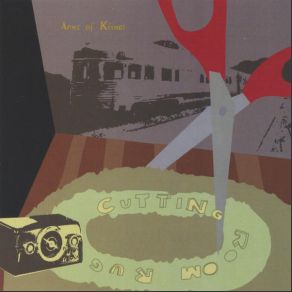Cutting Room Rug
Download links and information about Cutting Room Rug by Arms Of Kismet. This album was released in 2005 and it belongs to Pop, Alternative genres. It contains 11 tracks with total duration of 34:43 minutes.

|
|
|---|---|
| Artist: | Arms Of Kismet |
| Release date: | 2005 |
| Genre: | Pop, Alternative |
| Tracks: | 11 |
| Duration: | 34:43 |
| Buy it NOW at: | |
| Buy on iTunes $9.99 | |
Tracks
[Edit]| No. | Title | Length |
|---|---|---|
| 1. | Auriculara (Listen to Me) | 3:56 |
| 2. | Outbound Train | 3:53 |
| 3. | Clover | 2:56 |
| 4. | Listen (to This) | 0:30 |
| 5. | Coil | 4:59 |
| 6. | Life Imitates | 4:17 |
| 7. | Clarendon | 3:00 |
| 8. | Listen (to That) | 0:30 |
| 9. | Cracks | 3:51 |
| 10. | Pinnacle of Same | 3:51 |
| 11. | Listen to You | 3:00 |
Details
[Edit]The follow-up to Arms of Kismet's 2004 release, Eponymous, finds much darker things emerging from Mark Doyon's pen. The theme here is put right on the table with opening track "Auriculara (Listen to Me)," reprised with two 30-second moments later on — "Listen (To This)" and "Listen (To That)." Not recommended for bipolar people, there are more down moods painted then ups, making the earlier disc more inviting. "Clarendon" is an interesting episode on this close to 35-minute outing that travels through rockabilly and post-punk worlds like a journeyman possessed. The singer/songwriter stretches through these dark passages on Cutting Room Rug with his dry, witty observations. "Cracks" explains it in an airy moment, drums brushing against a collage of sounds that sets the stage for "Pinnacle of Same." "Pinnacle" hits a majestic tone aided by Beatles-influenced guitars — mastering engineer Jon Astley (having worked with George Harrison) certainly knows how to keep them subtle and sweet. It's the opposite of "Coil," a tune that pulsates slowly, with sounds that pull the listener back into the cave. "Life Imitates" finds Doyon's collaborator from his earlier Wampeters ensemble, Kowtow Popof, returning to lend a hand on what could easily be dubbed "downer folk." Other guests join the montage on this intriguing but sometimes disturbing statement, which closes out with "Listen to You." The give and take slips everything back into the solitary mood, kind of like George Harrison's reworking of the slow version of "Isn't It a Pity" on All Things Must Pass, a counterpoint to its exhilarating doppelgänger, in this case "Auriculara (Listen to Me)," which started the whole thing off.